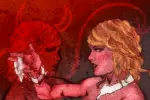Artist and rapper GoldLink has been dominating the new wave of hip hop with his own articulate sound. “Diaspora” is his first official album, but he has created chart-topping mixtapes and singles over the years. GoldLink’s renowned mixtape, “At What Cost,” delivered a mass of smooth tracks filled with Afro-infused beats.
He maintains his light-hearted energy with “Diaspora,” but the foundation for the title and theme of the album runs much deeper.
GoldLink centers his debut album around the African diaspora, which is a term used to describe the mass dispersion of Africans during the Atlantic slave trade. The diaspora scattered millions of Africans all over the globe, concentrating in America and the Caribbean. The dehumanization and mass distribution of Africans is an evident theme on the album.
The beginning of the album has sounds that mimic a run for survival. “Error” is an introductory track that consists of 21 seconds of a young, black male running away from imminent danger. The listener hears his choppy breath, flailing heart and a ticking clock. His hitting the pavement elicits a sensation of ultimate panic.
Throughout the project, GoldLink provides the perspective of a person contemplating, hiding and embracing their black identity. Although “Diaspora” has a heavy weight to its hidden messages and cultural basis, GoldLink likes to keep it light. He displays his pride for his African roots through the vibration of his beats.
Each song on “Diaspora” has a divergent, sonic energy to it, and its sound depends on who is accompanying GoldLink on the track. He has a wide range of artist features on the album, which alludes to the idea of diaspora and the alteration of a person’s cultural identity once they have been stripped away from their homeland.
The track titled “Zulu Screams” features German American singer Bibi Bourelly and British Nigerian producer and artist Maleek Shoyebi. “Zulu Screams” has a techno beat, and the sound of bongo drums in the background create an instant summer classic.
GoldLink presents himself as free, and his voice comes across as effortless and light. His hypnotic and psychedelic flow has put him in his own lane against other hip hop artists. He is not a lyrically dependent artist; rather, he is admired for his ability to tell a story through sounds.
GoldLink desires to not go too deep into reflections of his past with his music. On the track “Maniac,” he runs lyrical laps on the hard, snare beat, rapping, “Look, I don’t wanna talk about it all. I seen fiends, seen death, seen shots, seen this, seen that. Look, I don’t wanna talk about it all.” GoldLink doesn’t want his listeners to presume he has not been through hardships and dark times.
Nonetheless, his music is meant for dancing and celebrating. The universality of African sound and culture maneuvers its way through each track like a snake. “Spanish Song” showcases the power of unity when various cultural influences and organic sounds come together.
It is charged with Latin vibrancy as trumpets wail in the background, eliciting euphoria. GoldLink makes his passion for collaboration and cultural diversity known and proves that he can bring out a different side of a featured artists that listeners have been waiting to see again.
The track “U Say” follows suit and is the ultimate late night summer vibe, featuring a prominent Caribbean and Afro-inspired pulse. The song also welcomes well-known and beloved artist Tyler, The Creator. On Tyler’s latest project, “IGOR,” fans heard a more experimental and instrumentally heavy sound. On “U Say,” listeners experience Tyler spitting again and enjoy a track with the energy of an unstoppable MC.
This is a chaotic and unstoppable energy that fans haven’t seen from Tyler in quite some time. His heavy baritone voice glides over the beat like a ship as his lyrics touch on the excitement of foreplay and courting.
“Diaspora” is filled with songs that create a desire to find peace by adopting a positive ideology. At the same time, GoldLink still manages to sneak in moments of emotional suffering that have accompanied him on his road to success.
The summer party tracks with subtle moments of fear and resistance remind listeners that you can’t have the good times without facing the bad. On the track “Coke White/ Moscow” featuring rapper Pusha T, the beat is tough and filled to the brim with basslines that could throw punches.
GoldLink takes a new approach on the song; his flow is more aggressive and charged. He raps, “I done seen so many come, I done seen so many go. Pistol packing, then I started trapping, then I started rapping, then I blowed.”
Listeners gain insight into an emotional past filled with violence, grief and ambition, and GoldLink stresses the importance of remaining positive in the face of adversity.
On “Yard,” Jamaican drums take over, and he raps, “GoldLink is a black work of art. I don’t need no friends in my life. I don’t need no girl to get high, huh. I just need a boat and a tan. No bad vibes could enter my yard.”
With these lyrics, GoldLink directly references his desire to move on from past turmoil and seek refuge in lighthearted thoughts. He elicits a sunny disposition, which stands in stark contrast to the theme of African diaspora. Instead of clinging to the way society tampers and intrudes on black culture, GoldLink is full of pride. “Diaspora” draws attention to the universality of African sound and culture.
“Diaspora” illuminates the beauty of diversity by showcasing the influence of African culture and sound, no matter where it is distributed around the globe. GoldLink proves that he is in control over the indestructible power of what his cultural identity means to him.
















